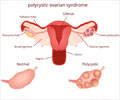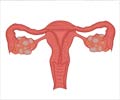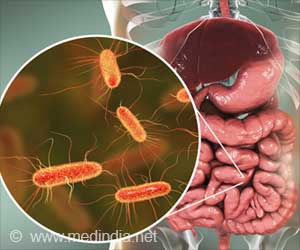- Women with polycystic ovary syndrome (PCOS) are more prone to eating disorders (ED)
- Weight stigma associated with PCOS often affects mental health and leads to disordered eating
- Healthcare providers should identify the risk of eating disorders in women with PCOS before recommending any lifestyle modifications
Increased Prevalence of Binge Eating Disorder and Bulimia Nervosa in Women With Polycystic Ovary Syndrome: A Systematic Review and Meta-Analysis
Go to source).
Polycystic ovary syndrome (PCOS), a common reproductive and metabolic condition, affects approximately 1 in 8 women. #PCOS #ReproductiveHealth #medindia’
How Does PCOS Affect Daily Life?
PCOS affects almost one in eight women. Women diagnosed with PCOS face an increased risk of developing metabolic conditions like diabetes, reproductive issues such as infertility, and psychological problems including anxiety and depression.Diagnosing Polycystic Ovary Syndrome
Women are diagnosed when they have at least two of the three key signs and symptoms of PCOS:- Increased numbers of ovarian follicles containing polycystic ovaries (immature eggs) seen on ultrasound
- Slightly high testosterone levels or clinical signs and symptoms of high testosterone such as excess body hair
- Irregular periods or no menstruation
Polycystic Ovary Syndrome and Eating Disorders: A Neglected Liaison
The systematic review and meta-analysis examined results obtained from 20 cross-sectional studies across nine countries to understand the strong link between PCOS and eating disorders. The studies included data from 28,922 women with PCOS and 258,619 women without PCOS.“This analysis is the first time we’ve been able to confirm an increased risk of specific eating disorders, including bulimia nervosa, commonly known as bulimia, and binge eating disorder,” said the study’s first author, Laura Cooney, M.D., M.S.C.E., associate professor at the University of Wisconsin in Madison, Wisc. Many women with PCOS often face weight stigma, and that can be detrimental to mental health, thereby leading to disordered eating.
When the researchers analyzed the women by body mass index (BMI), they found women with PCOS who had normal weight as well as those with excess body weight had higher disordered eating scores compared to women without PCOS. This indicates that the association is not dependent on BMI, said Cooney.
The findings of the study highlight the importance of screening women with PCOS for eating disorders before clinicians share any lifestyle advice, said Cooney. “The lifestyle modifications we often recommend for women with PCOS - including physical activity, healthy diet and behavior modifications - could hinder the recovery process for eating disorders. Therefore, healthcare providers need to be vigilant about screening for eating disorders in this population.”
Be a PCOS Warrior, Not Worrier
Women diagnosed with PCOS should Eat Good! Feel Good! Look Good!The meta-analysis did not find any direct link between PCOS and the eating disorder anorexia. However, the authors warn that studies on anorexia and PCOS are more limited. Hence, there should always be a high suspicion of any disordered eating pathology (DEP) in someone who is being evaluated for PCOS.
Reference:
- Increased Prevalence of Binge Eating Disorder and Bulimia Nervosa in Women With Polycystic Ovary Syndrome: A Systematic Review and Meta-Analysis - (https://academic.oup.com/jcem/advance-article-abstract/doi/10.1210/clinem/dgae462/7724213)
Source-Medindia
















